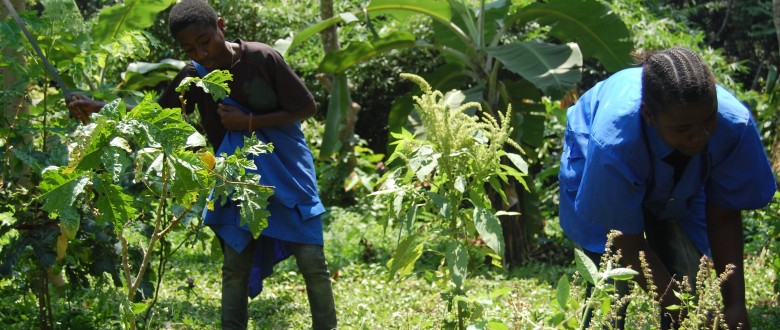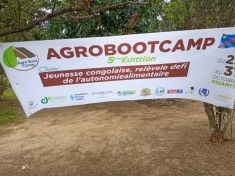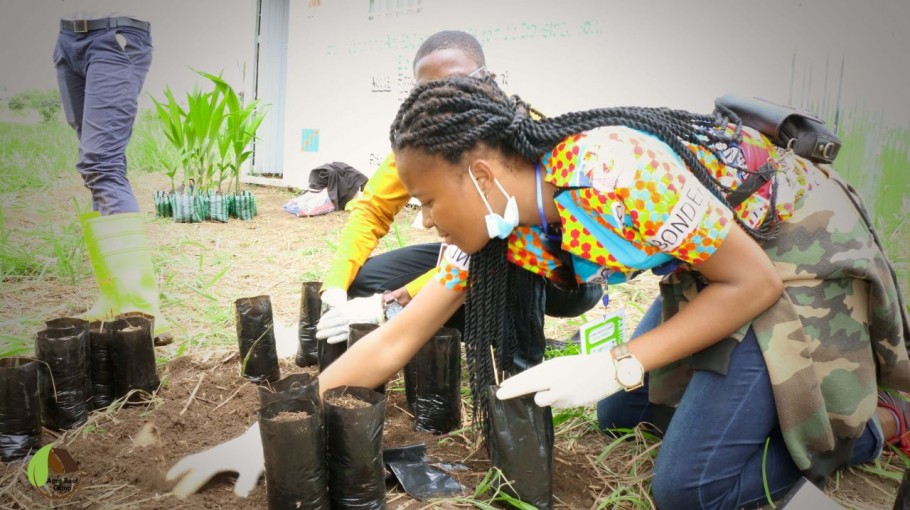
While agriculture in the DR Congo employs the majority of the population, only few young people choose to work in the sector. Keen to promote agri-entrepreneurship by choice, AgroBootCamp For Development invited VVOB to its youth training programme. We introduced entrepreneurial concepts and a business model canvas approach that is set to inform the nation’s continuous professional development for teachers and school leaders from 2021 onwards.
50 BootCampers
AgroBootCamp For Development is a 7-day training programme for youth in Africa on agro-ecology and green entrepreneurship. The fifth edition took place in the DR Congo in October, and brought together 50 young people to explore the agricultural sector, its trades and challenges, and how to set up a business that respects the environment. The AgroBootCamp was packed with discussions on the future of agro-ecology in the DRC, practical trainings, and introductions to concepts of agriculture and entrepreneurship.

VVOB was happy to take up a role in the facilitation. The organisers always invite local partners and experts to share their knowledge with the young participants. Our main focus was on entrepreneurship. We introduced key entrepreneurial concepts in a play-based manner, using a game developed by students from Belgium. Afterwards, the participants worked with a business model canvas (BMC) – a lean start-up model that offers an easy way to understand the core elements of a business.
“VVOB contributes to the professionalisation of schools, and skills youth so they can contribute to the further development of the agricultural sector. We share this vision with organisations such as AgroBootCamp”, says VVOB’s Technical Assistant Carnel Messa Kimvita (right). “Young people should be empowered to envision the future of their country. Students with a technical degree should be creators of work. Our initiatives encourage youth to see their role in contributing to food security and the sustainable development of their country."

He continues: "In the DRC, biodiversity and food security are at risk because of deforestation and unsustainable agricultural practices. We want to equip young people with competences to create green businesses that can provide for themselves and their families. Quality technical agriculture schools play a key role in achieving this.”
Where concepts come to life
The BMC tool is one of the cornerstones in the professional development offered by the inspection services and VVOB to teachers and school leaders of secondary technical agriculture schools in Kongo Central. Teachers and school leaders are supported to organise their education in a way that is practical and focused on entrepreneurship.
The schools’ production units are put at the heart of this new way of learning. The units not only play a role during students’ practical lessons, they also present plentiful opportunities to discuss the technical and business aspects of agriculture. In a context where pedagogical resources are very scarce, these real-life fields, food processing units, ponds and barns are the place par excellence where learners see theoretical concepts come to life and get a chance to practice a range of tasks in the management and daily operations of small enterprises.
Image-building with entrepreneurship education
The agricultural sector in the DRC is in need of a serious (image) boost. Despite huge potential, agricultural productivity is low and the country remains heavily dependent on import for most processed foods. With food prices recently shooting through the roof, the COVID 19 crisis has shown once again that this dependence increases food insecurity.
Seeing their parents’ hardship, Congolese youth hardly consider agriculture an attractive option for employment. That’s doubly true for young people who make it all the way to secondary education. Even those who study agriculture often prefer to use their skills elsewhere, which is a major loss for the sector.

Agriculture schools that can equip their graduates to manage the business side of agriculture and to generate a decent income, have an advantage when it comes to convincing parents and learners. That is why the Ministry of Education and VVOB worked together to integrate entrepreneurship education in the curricula for technical agriculture schools.
Actually implementing the curriculum is not easy. It takes a while for school leaders and teachers to consider their school-based production units as genuine businesses. Moreover, chalk and talk – the default teaching method in most classrooms – does little to stimulate learners’ entrepreneurial mindset and skills. By introducing the BMC as an approach for school leaders and teachers to improve the viability of their school’s production units and as a pedagogical resource for practical and playful entrepreneurship education, VVOB has been able to kill two birds with one stone.
From provincial to national level
VVOB, together with the education inspection services, trains and coaches school leaders and technical teachers to make production units work for both the school and its learners. The focus is on four aspects:
- Developing a vision for entrepreneurship education for their school
- Managing and monitoring a production unit with use of context-appropriate technical and financial tools
- Creating linkages with agri-entrepreneurs and agriculture support services outside the school
- Developing an entrepreneurial mindset and competences in learners
Tailor-made professional development trajectories have been tested out in 17 schools in Kongo Central. The provincial education inspection services are very enthusiastic and by 2021 they will be able to independently use a finalised version of the BMC approach in their support of agriculture schools. Together with these partners, we are also rallying for support at the level of the Ministry of Education, laying the foundations for roll-out in other regions of the country and a positive outlook for many more schools and students.

Picture above: ©AgroBootCamp




